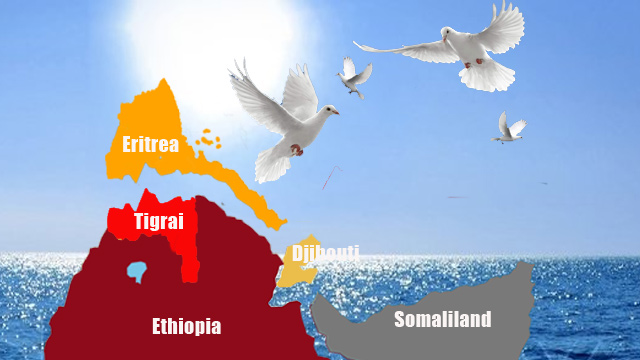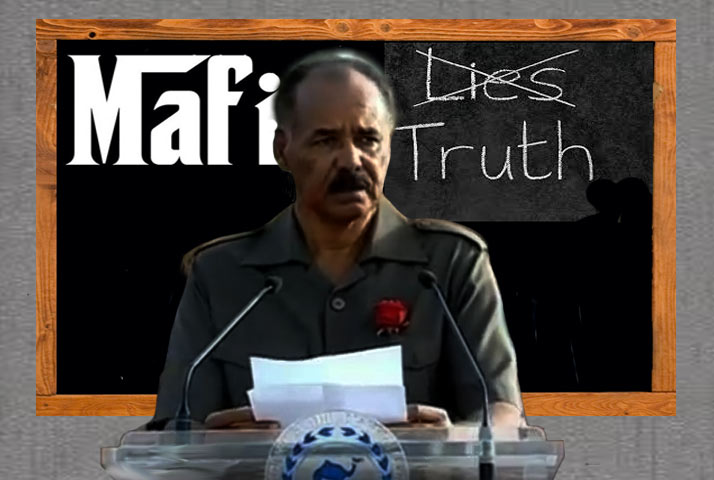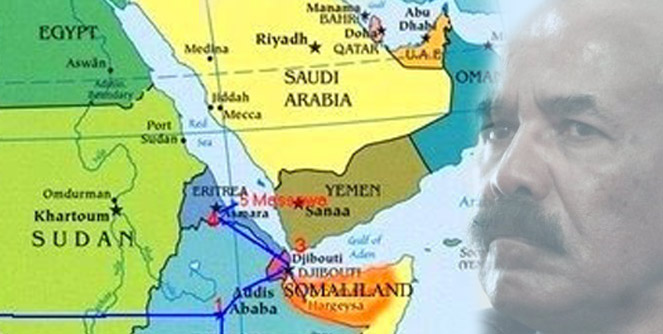Hitting the Enemy Where It Hurts the Most

An issue that often comes up in political discussions on Eritrea is whether political change in the country will be achieved through the efforts of domestic forces/elements or those of the exiled opposition movement. A general sense of ongoing debate on the subject seems to suggest that current political opinions are largely based on the implicit assumption that only one or the other of the two forces can bring change in Eritrea.
This type of exclusionary and fragmentary approach to political activism cannot lead to consensus on best strategy for effecting democratic change because it overlooks two important factors: Firstly, to be meaningful, planned (or expected) roles of political forces must pivot on a country’s existing sociopolitical conditions, i.e., realistic political roles can neither be assigned nor claimed in the abstract. Secondly, so long as they do not pursue antagonistic agendas, domestic and exiled actors should all have appropriate roles to play in the struggle for change. Such an inclusive and unitary approach would permit the forces of change to identify suitable roles for themselves and to optimize their respective contributions to the cause.
When applied to Eritrea’s ongoing struggle for democratic change, this pragmatic approach reveals an important truth: The critical question today is not whether opposition forces should all have a role in the ongoing struggle, but rather how best they can contribute to its success. This article attempts to address the latter question with specific reference to the Diaspora opposition. It proposes that, in view of the fact that much of the government’s power derives from its illicit overseas “assets,” the exiled opposition is ideally positioned to challenge the legality of these assets and their operations. It further argues that doing so would weaken the grip of the police state on the population, hence foster home-grown resistance to its tyrannical rule.
Focusing on such actionable ideas would give the opposition camp respite from the detrimental practice of engaging in seemingly interminable recounting of transgressions of a rogue regime long proven to be hopelessly irredeemable. There is also a dire need for shifting political discourse away from the currently pervasive tendency to harken back to past episodes of the regime’s decidedly autocratic history. If the struggle for change is to succeed, it must be guided by a strategy that draws on lessons of the past, focuses on the realities of the present and promotes actualization of our people’s hopes and dreams for the future.
Sizing Up the Regime’s Source of Power
It is widely known that Eritrea’s PFDJ government is bent on impoverishing the country, nurturing exaggerated fear of external threat and militarizing society as instruments for subjugating the population. The apparatus that integrates these instruments into a formidable police state is the regime’s notorious intelligence and security establishment whose surveillance and spying tentacles are felt in every sector of the population. Having put such an autocratic system in place, the regime has been trampling civil liberties and human rights to an extent that makes other dictatorships look benevolent by comparison. It routinely engages in arbitrary arrests, disappearances, torture and extrajudicial killings of innocent citizens as a way of clamping down on dissent and stamping out any opposition to its rule.
Given the enormity of this undertaking and the multitudes that engage in its operations, one cannot help but ponder over the question: How has the government of one of the poorest nations on earth managed to bear the cost of running such an oversized and complex surveillance system? It is common knowledge that the country’s economy is in ruins; that the private sector has been driven to near extinction by a regime with blatant hostility towards investment and private business; that, as the largest employer, the state has engineered a stunted productivity and pittance for wages to go with it; and that the country’s underutilized labor force is more of a drain on the national treasury than a booster of its revenues.
The answer to this legitimate question is to be found in the UN Somalia-Eritrea Monitoring Group (SEMG) reports on government compliance with provisions of Security Council sanctions resolutions. One of the Group’s principal findings is that the regime generates hundreds of millions of dollars annually from an illicit overseas economy managed almost entirely offshore through an intricate multinational network of companies, individuals and bank accounts. The regime is also beneficiary of a separate revenue stream that its political supporters in the Diaspora generate in various forms and under a variety of pretexts. As such the regime’s total offshore revenue does, in some measure, reflect the level of its external political support.
The implications of the SEMG findings for the political and socio-economic conditions in Eritrea were outlined in a recent article posted on awate.com. The article emphasized that the absolute power with which the PFDJ regime continues to impose its tyrannical rule on the people is, to a large extent, sustained by revenues from its illegal activities in foreign lands. Specifically, some of these ill-gotten funds are used to maintain a state security system that terrorizes the population and crushes the slightest manifestation of political activism with utter brutality.
Time for the Diaspora Opposition to Prove Itself
The PFDJ regime runs overseas affairs that include a wide range of illicit financial operations (as revealed in the SEMG reports) and political activities aimed at building support and stifling opposition among Diaspora communities (as exposed in Dutch court cases involving regime supporters).[1] These activities are closely intertwined and not amenable to neat classification into purely financial and political categories. For instance, regime supporters in the Diaspora engage not only in recruiting party cadres and silencing critics, but also in raising funds for the regime (as communities) and facilitating its illicit financial operations (by selected members).
These realities do afford the Diaspora opposition opportunities for playing a crucial role in advancing the struggle for democratic change. Such a role would entail formulation and systematic execution of an action plan designed to undermine and, if possible, thwart altogether the regime’s overseas operations. For ease of identifying some specific tasks of such a plan, this article uses the regime’s ‘mode of operation’ as a basis for grouping its varied overseas activities into: (i) those undertaken openly, and are therefore known to the opposition (overt operations) and (ii) those that are carried out clandestinely (covert operations).
- Overt Operations
A task that must be given priority in the movement’s agenda is ending the political and financial support that the regime draws from its control of Eritrean community organizations abroad. Activities undertaken by these organizations for the benefit of the regime include soliciting and collecting 2% tax and donations from Diaspora Eritreans, facilitating the transfer of hard currency remittances, organizing fundraising events and staging pro-regime rallies and demonstrations.
Regime activists accomplish most of these tasks by resorting to extortion, intimidation and harassment of anyone opposed to their political agenda or their underhanded tactics. Worse yet, community centers have turned into recruitment and indoctrination centers where fanatical ruling-party supporters are bred by poisoning young minds of Diaspora youth-groups dubbed YPFDJ. It must be noted that most of these activities and their underlying objectives are (at least in Europe and North America) contrary to requirements for nonprofit status and eligibility for state funding; and some are outright illegal. Thus, the opposition movement can capitalize on these breaches/violations and force community organizations to desist from serving as political tools of the regime or risk losing privileges and benefits they currently enjoy.
Opting for more aggressive measures, one can find two possible ways in which the opposition can prevent pro-regime elements from exploiting Diaspora communities to further their political agenda. One is for members of the opposition to get elected to majority leadership positions at communities and pursue an agenda of depoliticizing these organizations by steering their activities toward programs that are purely and exclusively sociocultural. Alternatively, they could establish in their respective cities substitute community organizations which are genuinely apolitical in orientation and exclusively social/cultural in function.
Many Diaspora Eritreans flock to PFDJ-sponsored community events not so much in support of their underlying political objectives as out of passion for the social and cultural entertainment they provide. So, by emphasizing the latter, opposition-led community organizations would easily win over most Eritreans in their respective localities. This would give their leaders leverage to put pro-regime rivals ‘out of business’ by claiming exclusive rights as genuine representatives of their constituencies, hence eligibility for state recognition and funding.
It must be acknowledged that, having challenged the status quo along the lines outlined above, opposition activists in some European and North American communities have achieved successes in empowering grassroots opposition and undermining the interests of the regime. These efforts must certainly be applauded for what they accomplished locally and for having produced models of activism that other communities could emulate. But to ensure the movement’s overall success, the fight against regime proxies abroad must be waged at a much higher level of efficacy – in terms of geographic extent of target areas, the persistence of the struggle and the intensity and vigor with which it should be undertaken.
- Covert Operations
As noted earlier, multinational operations of the PFDJ-owned business enterprise generate huge financial gains that continue to serve as the mainstay of the regime’s absolute power in the country. But, the documented illegality and criminality of these very operations (see SEMG reports) constitute the dark underbelly of the tyrannical regime. Opposition groups in the West should therefore seize on these revelations and bring legal action against the regime’s partners in crime operating in their host countries. However, unlike the regime’s overt operations, its covert ones are complex and require the acumen of professionals (in such relevant disciplines as law, finance, business management, etc.) to decipher.
A serious impediment to SEMG investigations was the regime’s secrecy, the opacity of its financial system and the resulting dearth of documentation on even the most basic aspects of the country’s economy. The Group had therefore to unravel the economic mystery by zeroing in on the government’s revenues and scrutinizing their sources, transfers, offshore bank deposits, allocations and spending. For obvious reasons, not all such fine details of the investigation are included in their reports. But, a close reading of those reports suggests that the Group would be predisposed to share them if requested through official channels by a legitimate entity. This is where the role of Eritrean professionals/intellectuals mentioned earlier comes in. Their status, the prestige of their institutions, their professional contacts and their privileged access to info/data are crucial for gaining access to the invaluable unpublished findings of the SEMG and for possibly augmenting them with independent information.
The expertise of such professionals is also indispensable to the process of compiling and evaluating the facts and evidence so obtained. This process must be undertaken to identify: (i) business operations that the regime undertakes contrary to stated policy and/or in violation of the laws of the host country, and (ii) local entities i.e., agents, business partners, front companies, etc. that collaborate with the regime in these operations. Based on results of this review, activist professionals would build cases against the regime and its local business associates in the form of lawsuits (to be filed with the courts) and appeals and petitions (to be lodged with appropriate authorities) of host countries. These initiatives would then be buttressed with mass action in which the rank and file of the opposition movement would mobilize in support of the cause by engaging in such activities as making telephone calls, signing petitions, lobbying the authorities and staging rallies to demand justice and/or government action.
One may appropriately ask: “How many such cases should the Diaspora opposition pursue to undermine the regime’s grip on power?” The answer is: Ideally, as many as circumstances permit. But at a minimum, a couple of carefully-planned, skillfully-executed and well-fought cases can trigger a concatenation of events that would jointly lead to substantial erosion of the regime’s dictatorial power. This would inevitably entail weakening of the political stranglehold that the security establishment has put on the population. Such regime setbacks would certainly embolden the population to break out of the fear that has griped them for too long and begin to fight back against the regime’s cruelty and oppression.
Conclusion
Eritrea’s evil mafiacracy is pushing ahead with its satanic mission of destroying the country and emptying it of its population. This at a time when the Diaspora opposition movement is in a state of paralysis for lack of clear sense of direction and owing to failure of its constituent factions to find common ground for effecting political change. In consequence, the country’s continuity as a nation-state is increasingly coming into question. And any effort for averting such a prospect will have to be undertaken in a state of an ever-narrowing window of opportunity.
To this end, Diaspora opposition groups must first redeem themselves and imbue their existence with political relevancy by reforming their institutional framework and rethinking their strategy. They can no longer hide behind the stale notion that it is the people inside the country who should rise and bring about political change. These groups would do well to admit that the very resources which enable the regime’s security apparatus to keep the population virtually shackled is being generated right in the Diaspora’s ‘home turf!’
It is often remarked that Eritrea has its fair share of intelligentsia among its sizeable exiled population. However, with few notable exceptions, members of this elite class have remained seemingly indifferent to the plight of their people and are known to have done very little to bring about their emancipation from tyranny. Many of those have evidently been living in a bubble of comfort, ambition and self-interest from which they have willfully erased any memories of their past. But then, there are others for whom the meaning of life goes far beyond the pursuit of one’s selfish interests and who still have an ear for the cries of their suffering people. It is members of the latter group that are being called upon to dedicate some of their time, effort and talents to the lofty cause of rescuing the country and its people from passing into oblivion.
References:
[1] A Mafia Group Masquerading as Lawful Government
[2] UNSC—SEMG Sanctions Committee (work and mandate reports)




Awate Forum